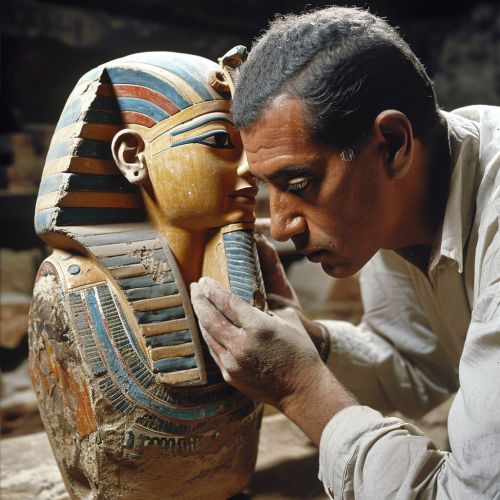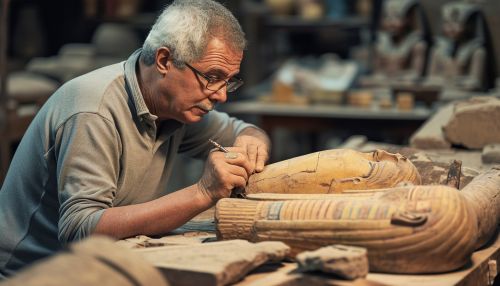Egyptology
Introduction
Egyptology is the scientific study of the history, languages, literature, religion, and art of ancient Egypt. This discipline, a subset of the broader field of archaeology, emerged in the 19th century with the decipherment of the Rosetta Stone's hieroglyphs.


History of Egyptology
The history of Egyptology spans several centuries, beginning with the ancient Greeks and Romans' fascination with Egypt, through the Middle Ages, and into the modern era. The systematic study of ancient Egypt as a distinct discipline, however, did not begin until the 19th century.
Ancient Interest
The ancient Greeks and Romans had a keen interest in Egypt, with scholars such as Herodotus and Pliny writing extensively about the land and its people. However, their understanding of Egyptian culture and history was often flawed or incomplete.
Middle Ages
During the Middle Ages, knowledge of ancient Egypt in Europe was extremely limited. The Arab scholars, however, preserved and expanded upon the knowledge of the Greeks and Romans, with scholars like Ibn Wahshiyya and Al-Biruni making significant contributions.
Modern Egyptology
The modern field of Egyptology began in the 19th century, largely due to the work of Jean-François Champollion and his decipherment of the Rosetta Stone. This breakthrough allowed scholars to read ancient Egyptian hieroglyphs for the first time in centuries, opening up a new world of research and discovery.
Methods and Techniques
Egyptologists employ a variety of methods and techniques in their research, including archaeology, epigraphy, and linguistics. These methods allow them to uncover and interpret the rich history and culture of ancient Egypt.
Archaeology
Archaeology is a crucial tool in Egyptology, with excavations providing a wealth of artifacts and structures that offer insights into ancient Egyptian life. Techniques such as stratigraphy and seriation are used to date these finds and place them in their historical context.
Epigraphy
Epigraphy, the study of inscriptions, is another vital tool in Egyptology. By deciphering and interpreting hieroglyphs, demotic script, and other forms of ancient Egyptian writing, Egyptologists can gain insights into the culture, religion, and history of ancient Egypt.
Linguistics
The study of ancient Egyptian languages, including Old Egyptian, Middle Egyptian, Late Egyptian, and Coptic, is a crucial aspect of Egyptology. Understanding these languages allows Egyptologists to read and interpret texts, providing valuable insights into ancient Egyptian society.
Major Discoveries
Over the centuries, Egyptologists have made numerous significant discoveries that have greatly increased our understanding of ancient Egypt. Some of the most notable discoveries include the Rosetta Stone, the tombs in the Valley of the Kings, and the city of Amarna.
Rosetta Stone
The Rosetta Stone, discovered in 1799, was crucial in deciphering ancient Egyptian hieroglyphs. The stone features a decree issued in 196 BC, written in three scripts: Greek, demotic, and hieroglyphic. The Greek text's translation allowed Jean-François Champollion to decipher the hieroglyphs, opening up the world of ancient Egypt to modern scholars.
Valley of the Kings
The Valley of the Kings, located on the west bank of the Nile near modern-day Luxor, is the burial site of many pharaohs from the New Kingdom period. The most famous tomb is that of Tutankhamun, discovered by Howard Carter in 1922. The tomb's contents, including the pharaoh's golden mask, have provided invaluable insights into royal burial practices and beliefs about the afterlife.
Amarna
The city of Amarna was the capital of Egypt during the reign of Akhenaten, who attempted to shift Egypt's religion from polytheism to monotheism. The city's discovery has offered Egyptologists a unique glimpse into this tumultuous period in Egypt's history.
Current Research and Future Directions
Modern Egyptology continues to make significant strides in understanding ancient Egypt. Current research focuses on areas such as digital archaeology, genetic studies, and the reinterpretation of previously discovered artifacts and texts.
